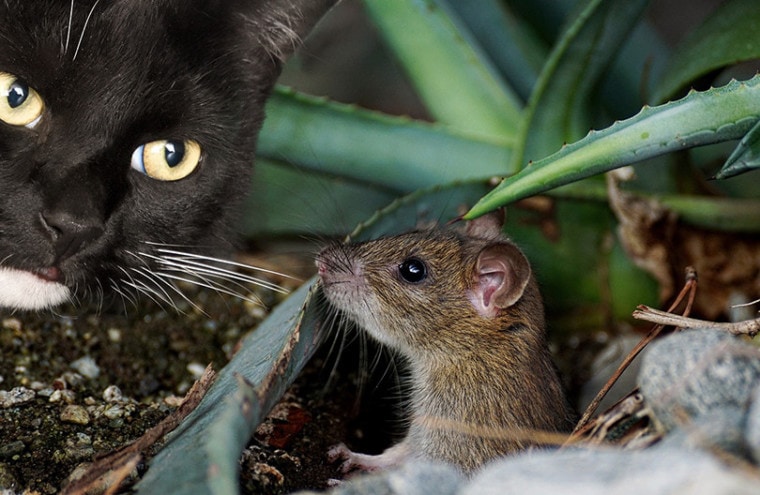
Click to Skip Ahead
Cats tend to play with mice and other prey such as birds, insects, and other small creatures before they finish the kill. This behavior is very common, yet many are left wondering why felines practice this strange behavior. It seems unnecessary and cruel to play with and torture the prey instead of going in for an instant kill. So, why exactly do they do this? Let’s look further into this and try and understand a cat’s hunting behaviors.
 Why Don’t Cats Just Kill Their Prey?
Why Don’t Cats Just Kill Their Prey?
A cat’s hunting instincts are very apparent, even for those domesticated and kept indoors. Anything small and in motion will kick off their predatory drive. Cats are meticulous and highly effective little hunters, and their hunting habits are a result of natural evolution.
Researchers took to studying this behavior as early as the 1970s to try and determine precisely why cats feel the need to play with their prey before completing the kill. This study revealed very interesting information.
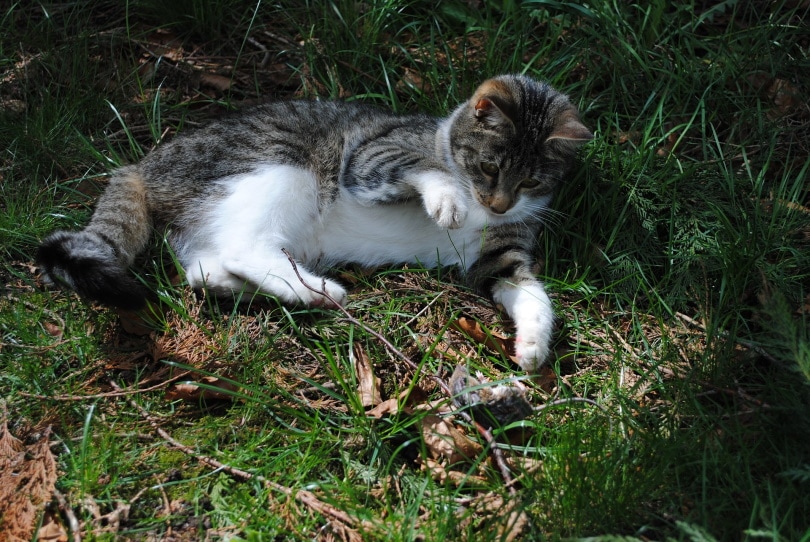
Facts About Cats Playing With Their Pray
The Larger the Prey, the Longer the Play
Larger prey was played with by cats much longer than smaller prey. For example, rats were kept alive longer than mice. It was concluded that the larger a prey animal, the more dangerous it could be for the cat.
This is likely due to the need to tire out the larger prey to ensure they are less of a threat when they go in for the kill. The more exhausted and disoriented the prey is, the less likely they are to properly defend themselves and cause injury to the cat.
The Hungrier the Cat, the Quicker the Kill
It was also observed that the hungrier a cat was, the quicker it would kill its prey. Many owners naturally assume that their cat is hunting because they are hungry, but that is not always the case. Cats have evolved into opportunistic hunters.
Each hunt has approximately a 30 percent success rate for domesticated cats. To sustain themselves, cats will hunt when the opportunity presents itself rather than only when they are feeling hungry. Cats are well adapted to eat smaller amounts of food more frequently, as compared to large amounts in one sitting. The instances of playing with prey were notably longer when a cat was hunting for an opportunity, as opposed to current hunger.
Not All Play Ends in a Kill
It is important to note that this study also revealed that not all interactions with prey animals ended in death. In addition to being skilled hunters, cats are very playful creatures that enjoy mental stimulation. Some cats were observed playing with the prey instead of killing it. Of course, the prey animal does not know this and will be in survival mode.
A Cat’s Hunting Strategies
Cats have different hunting strategies that depend on the situation they find themselves in and the opportunity that presents itself. Generally, there are three different strategies they use. Let’s check it out:
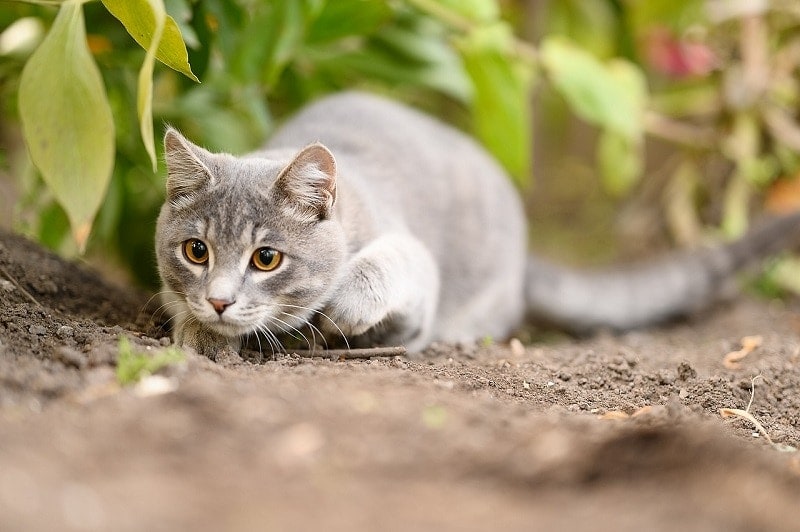
Indoor vs. Outdoor Cats
Overall, cats have the same natural hunting instincts. Some differences may be noted in the effects of hunting behaviors between indoor and outdoor cats though. Let’s look:
4 Things You Can Try to Minimize Hunting
Hunting is an instinct that can be inconvenient for some cat owners. Punishment is never advised for any natural behavior. There are some things you can try that may help reroute their hunting behaviors though. This can help keep the hunting of small animals to a minimum.
1. Redirect with Play
Redirecting your cat’s hunting instincts through frequent play is one of the most effective ways to deter natural hunting behavior. Make sure you have a variety of toys and set aside some time to play with and engage your cat. This is not only beneficial in rerouting behavior, but it is enriching for your cat and great for their overall health and well-being.
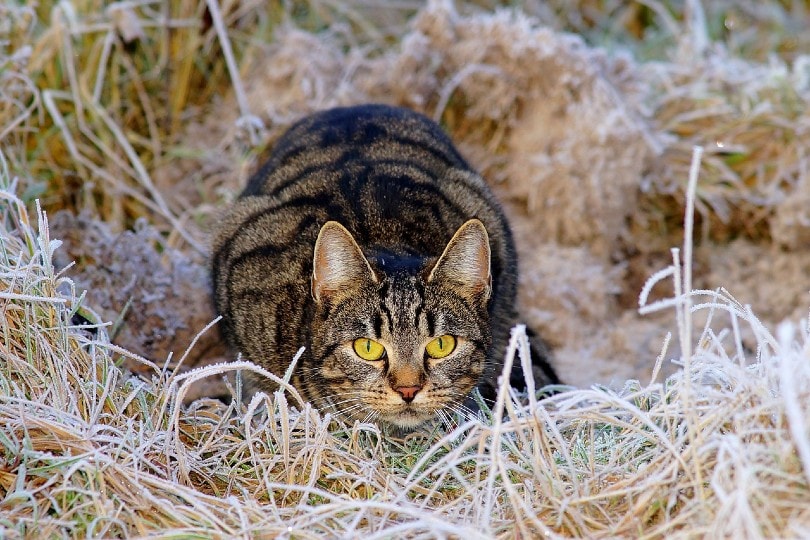
2. Ensure Proper Dietary Needs Are Met
Cats hunt out of instinct and are opportunistic hunters, however, a cat that is not having their proper dietary needs met will seek out food by hunting. Ensure your indoor or outdoor cat is supplied with a proper diet that is appropriate for their age, size, and activity level. Feeding smaller, more regular meals can be helpful as well.
3. Try a Collar
One way to help deter hunting is by using a collar with a bell. A bell will sound off when the cat is in motion and tip off the prey animal. This will put a damper on those stealthy hunting skills and make it more likely for prey to escape. Make sure to use a break-away collar; you do not want to risk your cat getting hung up and potentially hurt by a collar that becomes snagged or stuck.
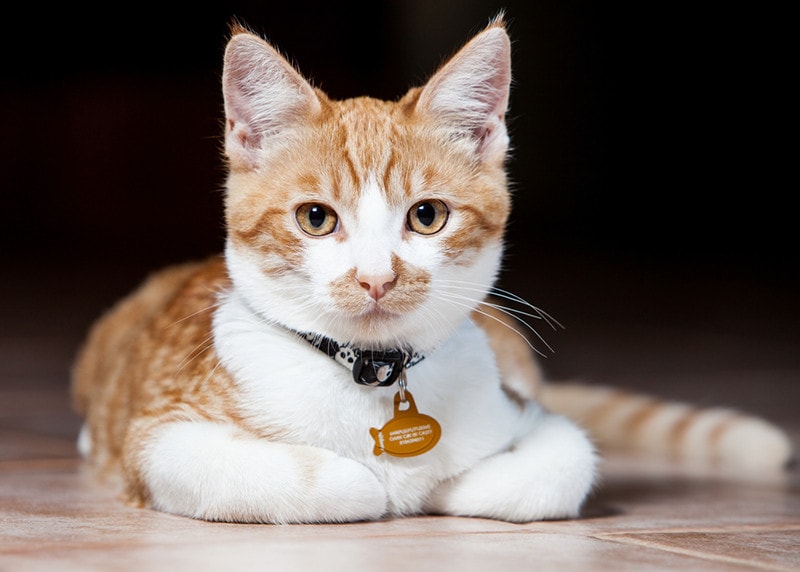
4. Keep Them Inside at Certain Times
Cats typically hunt during dawn, dusk, and overnight. Prey tends to be active during these times of day, which causes cats to be more active during this time as well. This gives them the best opportunity for a successful hunt. Try keeping your cat indoors during these times of day to keep the hunting to a minimum. There won’t be much you can do if you have mice indoors, as they tend to come out at night and scour the counters. Make sure to keep traps out in safe, secure areas to try and prevent them from catching your cat’s attention.
 Conclusion
Conclusion
It is important not to relate your cat to human-like qualities. Cats do not play with their prey due to malicious intent, but evolutionary hunting behaviors have led them to become the successful hunters they are today. While it may seem very cruel and is undoubtedly difficult to watch, your cat has no intention of torturing their prey but is instead exhibiting a predatory response.
See also:
- Do Cats Miss Their Owners? (5 Signs They Do)
- Why Does My Cat Suck on Blankets? 6 Possible Reasons For This Behavior
Featured Image Credit: 165106, Pixabay

 Why Don’t Cats Just Kill Their Prey?
Why Don’t Cats Just Kill Their Prey? Conclusion
Conclusion



